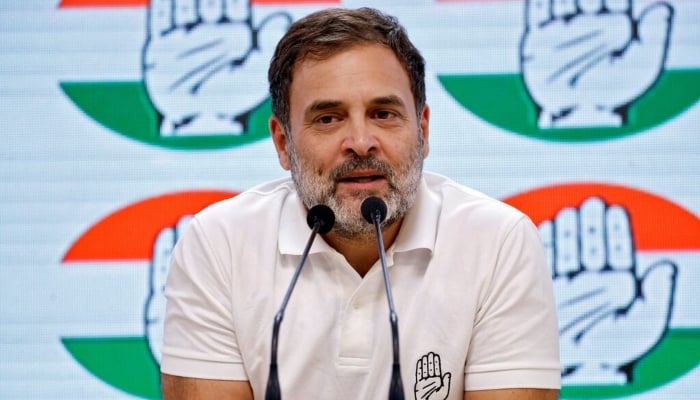
Rahul’s ‘surrender’ comment draws fierce BJP backlash.
Sudhanshu Trivedi calls INC leader “Rahul Munir” and “Rahul Sharif”.
Congress questions impact of foreign visits by parliamentarians.
The Bharatiya Janata Party (BJP) has accused Congress leader Rahul Gandhi of an act tantamount to “no less than treason” after he described Indian Prime Minister Narendra Modi’s foreign policy as a “surrender” following Operation Sindoor, Indian media reported.
On Wednesday, BJP President JP Nadda posted on X (formerly Twitter) that Gandhi’s remarks were an insult to the Indian armed forces and tantamount to echoing Pakistani propaganda, “…calling the unmatched valour and courage of the Indian Army a ‘surrender’ is not only unfortunate but also a grave insult to the Indian Army, the nation and 140 crore Indians.”
“This is no less than treason”, Nadda added. “Rahul Gandhi, you, your party and your leaders might have surrendered because this has been your history, but Bharat never surrenders.”
In a series of sharp posts, Nadda accused the Congress party of a legacy of capitulation: “Surrender is in your party Congress’ dictionary, it is in your DNA… You surrendered to terrorism, surrendered in Sharm-al-Sheikh, surrendered at the table in Shimla after winning the 1971 war, surrendered in the Indus Water Treaty… and even surrendered to the Muslim League at the time of independence of the country.”
Echoing Nadda’s sentiments, BJP national spokesperson Sudhanshu Trivedi escalated the attack in a press conference, branding Gandhi as “Rahul Munir” and “Rahul Sharif” and claiming the Congress leader had gone further than even Pakistan’s top leadership in allegedly undermining India’s position
The BJP’s counteroffensive came in response to increasing criticism from the Congress and other INDIA bloc parties over the Indian government’s handling of foreign affairs, the Pahalgam terror attack, and what they see as an opaque and manipulated narrative around Operation Sindoor.
On Wednesday night, Congress MP Jairam Ramesh took to social media to target the government’s global outreach initiative. Referring to the External Affairs Minister (EAM), Ramesh wrote: “Tomorrow, the unusually low-profile EAM is meeting with some MP delegations that have returned. Hope there will be an honest assessment of what was actually accomplished — not what was spin doctored.”
“There are reliable reports that the welcome in some countries was very lukewarm — to put it mildly — and that the political value of the people the MPs met was below par. Videos of the MPs engaging in silly fun and frolic while on a serious national mission have also been surfacing.”
Earlier the same day, Ramesh had criticised the government’s scheduling of the upcoming monsoon session of parliament, calling it a tactic to avoid convening a special session as demanded by the opposition.
“Never before in India’s parliamentary history has a session been announced 47 days in advance”, he said.
“Why was Operation Sindoor stopped suddenly after four days? Why did President Trump repeat 12 times in 20 days that the ceasefire happened because of him? These are the questions the prime minister does not want to answer.”
Union Parliamentary Affairs Minister Kiren Rijiju had announced that the monsoon session will commence on July 21 and continue till August 12. It will be the first session since Operation Sindoor.
The demand for a special session was also amplified by Samajwadi Party MP Rajeev Rai, who was part of an all-party delegation sent by India that recently visited five countries — Russia, Slovenia, Greece, Latvia and Spain.
“PM should have called the special session by himself”, Rai told ANI. “In 1962, when the war against China was at its climax, first-time MP Atal Bihari Vajpayee had demanded a special session mid-war. Nehru ji had called the special session then… We followed the ‘rashtra dharma’, but the government should follow ‘raj dharma’.”
Congress chief Mallikarjun Kharge on Tuesday reiterated the opposition’s call for a special session to address key national concerns, including the Pahalgam attack.
Adding fuel to the fire, Congress leader Pawan Khera alleged that India was isolated diplomatically following the operation. “In the Modi government, all policies within the country are being run by trolls, and the foreign policy abroad is being managed by a person who has surrendered”, he posted on social media.
He claimed that India’s diplomatic standing had weakened, citing Kuwait’s move to lift visa restrictions on Pakistan and its subsequent agreement with Pakistan on labour issues. “That’s why they say — ‘Name Narendra, work surrender’”, Khera wrote.



